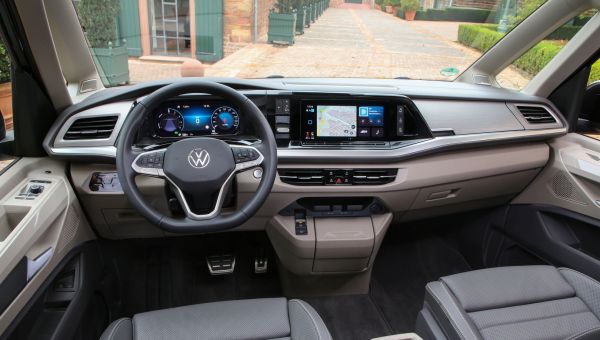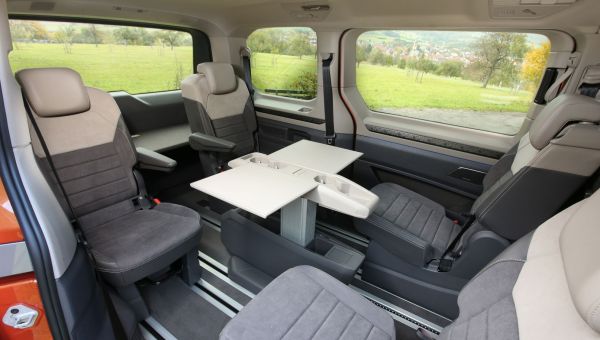WHAT IS IT?
When it comes to settling on a family car, it’s all too easy to fall into the trap of believing a crossover is a be-all and end-all. Sure, models like the Nissan Qashqai and Ford Kuga serve a purpose, but what they don’t tend to offer is a huge amount of space.
This is where van-based people carriers step in, and one of the most dominant players is Volkswagen with its Transporter van and subsequent passenger versions. It’s been a hit with buyers for years, but – and especially as more conventional MPVs have pretty much vanished – VW is looking to reinvent it with the all-new Multivan.
WHAT’S NEW?
While it still has ‘van’ in its name, and looks a lot like one too, what this VW actually isn’t is a van. That’s right, the Multivan is actually a completely separate offering to the Transporter, and essentially replaces the plush Caravelle.
Now based on the MQB platform that underpins cars like Volkswagen’s own Tiguan, it aims to make the Multivan more ‘car-like’ than ever, while also making way for a range of safety, tech and powertrain advancements – not least the option of a plug-in hybrid, which is the first to be offered under the Volkswagen Commercial Vehicles umbrella.
WHAT’S UNDER THE BONNET?
The Multivan launches with two turbocharged petrol engines (a 134bhp 1.5-litre and 201bhp 2.0-litre) and the eHybrid we’re trying here. Somewhat confusingly, a diesel – which remains especially popular on models like this – won’t arrive until the middle of next year. All Multivans also use a DSG automatic gearbox too.
But back to the eHybrid, which uses the VW Group’s tried-and-tested 1.4-litre petrol combined with an electric motor and 10kWh battery. The combined power sources push out 215bhp and 350Nm of torque, enabling a 0-60mph time of 11.6 seconds and a top speed of 118mph.
Full efficiency figures are still to be confirmed, but a 31-mile electric range should help drive down running costs and emissions (especially on short trips like the school run), while its relatively small battery takes around three hours and 40 minutes to charge.
WHAT’S IT LIKE TO DRIVE?
Volkswagen makes a big deal about the Multivan’s car-like behaviour on the road, and it’s largely true. Though the Caravelle was already one of the better-driving models in this class, the Multivan is a big step up.
It’s the refinement that’s especially impressive, as it shrugs off the van-like roots and is even impressively quiet at motorway speeds, while it’s not too bad to drive when things get a bit twistier, though it does struggle for grip at times – something likely solved if Volkswagen introduces a four-wheel-drive option later down the line. The only other slight caveat is that the low-speed ride remains a bit unsettled and – dare we say it – van-like.
However, one main thing that strikes you about the Multivan is its manoeuvrability. The number of windows make it feel like a greenhouse, while a surprisingly tight turning circle means it’s easy to park too. It’s also slightly lower than the Caravelle, meaning it’s more likely to fit in tight parking garages.
HOW DOES IT LOOK?
Volkswagen’s ‘T’ line-up of models command loyalty that other brands can only envy, and this T7 – another name for the Multivan – manages to retain the Transporter’s charm, yet be modernised as well. Granted, there’s no disguising its sheer boxy shape, but the two-tone paint schemes on offer, impressive LED lighting and body-coloured grille give it a level of charm you just don’t get with models in this sector normally.
There are also two lengths on offer – the standard car measuring 4.98m and the longer adding 20cm to that thanks to a rear overhang. Though adding greater boot space (it’s worth noting the wheelbase remains the same), it doesn’t half start to look bulbous.
WHAT’S IT LIKE INSIDE?
A Multivan needs to deliver on space and versatility and, oh boy, does it succeed. There are cubby holes absolutely everywhere to store odds and ends, while the sheer size of it allows for acres of room.
You can have it with six or seven seats, with the rear seats all being placed on rails, allowing them to be slid easily, or individually removed in a matter of seconds. If you’ve ever had the misfortune of having to remove the full rear bench of a Caravelle, you’ll realise just how big of a step up this is.
There are also sliding doors as standard (they’re electric on higher-spec cars), while you can run the centre console from the front to the back on the same rails, which is a really nifty touch. There’s clearly been a huge amount of thought put into the Multivan’s practicality and it really is exceptional.
WHAT’S THE SPEC LIKE?
Prices are yet to be announced, but a product manager said that VW hopes to actually make it cheaper than the outgoing Caravelle.
Again, full specifications haven’t been detailed, but all models will feature LED headlights, cruise control and a large 10-inch touchscreen and digital dials as standard (just like you get on the latest Golf). Our test option was the Energetic, which will be the launch edition and bring a whole range of extra kit, including a 360-degree camera, heated electric seats and large alloy wheels.
VERDICT
Volkswagen labels the Multivan as the ‘perfect car for families’ and it really is hard to disagree. Though the Transporter was – and remains – a very practical tool, this new car is on another level. There really isn’t another car (or van – whatever you want to call it) that offers this level of versatility on sale today.
Add in the fact that the Multivan remains desirable to look at and modern inside, and there’s a huge amount going for it. Though we’ll reserve full judgement until pricing and specifications have been detailed – and the Multivan likely won’t be cheap – if you crave the ultimate in family transport, they won’t get much better than this.
FACTS AT A GLANCE
Model: Volkswagen Multivan
Model as tested: Volkswagen Multivan eHybrid Energetic
Engine: 1.4-litre petrol-electric plug-in hybrid
Power: 215bhp
Torque: 350Nm
Max speed: 118mph
0-60mph: 11.4 seconds
MPG: NA
Emissions: N/A
Electric-only range: 31 miles
















